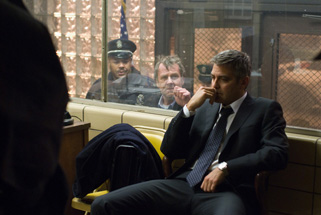Movie Review: Michael Clayton
By Matthew Huntley
October 27, 2007
BoxOfficeProphets.com

What's ironic is that Michael Clayton is a genuinely decent man and very good at what he does. But nobody sees or know this but the audience. Whereas the rest of the characters in "Michael Clayton" only look out for themselves, Michael is a victim because he actually cares for other people and stops to think about what he does, so much that it's starting to hurt.
It's been a while since I've been so enveloped by a film, but "Michael Clayton" hit me on every level - physically, mentally, emotionally. The story and characters find perfect sync, and the acting, directing, writing and editing work in the classical sense to completely involve the audience in its dirty world. "Michael Clayton" is sure to become a classic itself, perhaps even set new standards.
George Clooney, in the very best performance of his career, plays Michael Clayton, who's not exactly a lawyer for one of the world's leading law firms, but more a facilitator for its partners and their clients. "I'm not a miracle worker, I'm a janitor," he says. That is to say, it's his job to clean up other people's messes, although he's not proud of it. He's tired, angry and disillusioned because his job has made him forget the beauty and innocence that can still be found in the world. Michael wants out. He's just not in a sound financial state to leave.
The firm Michael works for, Kenner, Bach & Leener, is currently defending a class action lawsuit against a leading agrochemical company called U/North, and the case takes a bad turn when the leading defender, Arthur Edens (Tom Wilkinson), strips down naked during a deposition. Arthur is a manic depressive with a chemical imbalance, which he's kept under control, but he's stopped taking his medication. Now he's anxious, incoherent and speaks of crazy things like being Shebha the Goddess of Death.
Karen Crowder (Tilda Swinton) is about to take over as U/North's in-house chief counsel and she needs the class action suit to disappear. But Arthur's stunt has disrupted the case and could potentially sabotage Crowder's career. Why would Arthur do such a thing? Because he believes himself to be evil and feels ashamed to defend a company he now thinks is guilty. U/North is accused of releasing a poisonous weed killer into a town's water supply.
Marty Bach (Sydney Pollack) asks Michael to rectify the situation, which could potentially cost his firm millions. At first, Michael is reluctant to believe Arthur and his cockamamy stories, but even so, we see the moral dilemma Michael finds himself in. If he's not loyal to the firm, he could lose all his assets and equity (he's already in deep because he invested in a bar that just went under). Yet, if he's not loyal to his friend Arthur, he could lose himself entirely.
Although it's complex and thoroughly engaging, it's not the plot of "Michael Clayton" that matters; it's the characters who inhabit it. Each one is morally reprehensible, yet we believe and understand why they behave the way they do. We sympathize with them as well as condemn them. They're lonely, insecure, anxious, selfish and conniving people, who are also morally aware, but in the end, we're not sure who's going to obey their conscience. All of them have made lying an essential part of their lives.
We first see Michael playing poker in a seedy underground building in New York City, which we learn later is one of his weaknesses. One of his brothers is a cop and the other a recovering alcoholic, and that puts Michael in the middle, only he doesn't have the luxury of a label to identify himself. He's an inattentive father to his son Henry (Austin Williams) and he always seems to be chasing after something. He just doesn't know what that is.
To see George Clooney this strong is amazing, though not surprising. Clooney has always been a reliable actor, but the past few years show he possesses an ambition and courage to be so much more. We're used to his "movie star" qualities dominating his performances, but here he transforms and allows himself to be vulnerable.
Tony Gilroy, a longtime writer of Hollywood action thrillers, makes an exceptional directorial debut. At the forefront of this mystery thriller are characters who are scared to be themselves. Tilda Swinton is masterful (as usual) as a woman who must pretend to be strong and forceful but who is really afraid and nervous. She has low self-esteem and relies on her image to hide her true nature.
Gilroy doesn't write any of his characters as one-note, but instead allows the ramifications of their behavior to guide the story. We can see that Michael wants to do what he can to better the world, and there's a moment he shares with his son that's so profound and honest, so well-acted and written that I wanted the feeling and tone of this scene to go on forever. Notice the subtle nuances of Clooney's face when he talks. The timing couldn't be better.
"Michael Clayton" suggests anything we see from here on out with George Clooney, Tilda Swinton, Tom Wilkinson, Sidney Pollack, or made by Tony Gilroy, should automatically raise expectations. If they can choose to tell a story this brave and intelligent, not to mention make a film this energetic and entertaining, there's no telling how far they can reach.
The film is so good I imagine the moment we first see Michael Clayton to become an iconic cinematic image. In the shot, Michael has a smirk on his face, but he's not smirky. Behind it is a troubled, torn individual whose story will involve and stay with us for a long time.